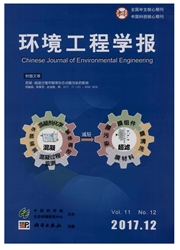

 中文摘要:
中文摘要:
为了探讨利用热化学方式从城市垃圾中制取富含氢气合成气过程的要素影响,解析氢气发生特性及其与主要影响要素之间的关系。在分析了城市生活垃圾组分特性的基础上,将其加工成组分均一的废弃物衍生燃料(refusede—rivedfuel,RDF),并在700、800和900℃等3个温度条件下,分别开展了RDF的热解、气化及水蒸汽气化等实验。研究表明,RDF的加工不但可有效降低垃圾含水率,还可将垃圾热值提高近1倍。温度和添加水蒸汽是从RDF中制取富含氢气合成气过程中的关键影响要素。其中,温度对氢气生成起到至关重要的决定作用,温度的提高对促进H,浓度的提高有利,同时,在气化过程中添加水蒸汽,可有效促进CO和H,等有价气体组分生成。在900~C的高温水蒸汽气化处理过程中,可获得H,浓度最高为34.13%的合成气。另外,800℃热解过程所产生的合成气热值最高,达到14509kJ/Nm3。
 英文摘要:
英文摘要:
A detailed research of the major influencing factors on hydrogen-rich synthesis gas production during the thermochemical municipal solid waste (MSW) was carried out. The relationship between hydrogen generation characteritics and major factors was investigated. A detailed analysis about the components of MSW was made. MSW was pretreated into refuse derived fuel (RDF) to achieve a raw material with homogenization components for the following gasification experiments. RDF was employed to carry out a series of pyrolysis experiments, gasification experiments and steam gasification experiments at 700, 800 and 900℃, respectively. The experimental results indicate that, by manufacturing MSW into RDF, not only the moisture content can be effectively reduced, but also their low heating value (LHV) can be increased nearly double. It also demonstrates that temperature and steam are key influencing factors, furthermore, it is confirmed that steam supply during gasification will promote hydrocarbons of waste to be decomposed into valuable gas compositions, such as CO and H2- However, temperature plays a dominate role in hydrogen generation. The higher temperature is, the more hydrogen can be achieved. It shows that a kind of synthesis gas containing the highest hydrogen concentration to 34.13% can be generated from steam gasification process at 900℃ ,and the maximum LHV of gas to 14 509 kJ/ Nm3 can be achieved during the ovrolvsis orocess at 800℃.
 同期刊论文项目
同期刊论文项目
 同项目期刊论文
同项目期刊论文
 期刊信息
期刊信息
